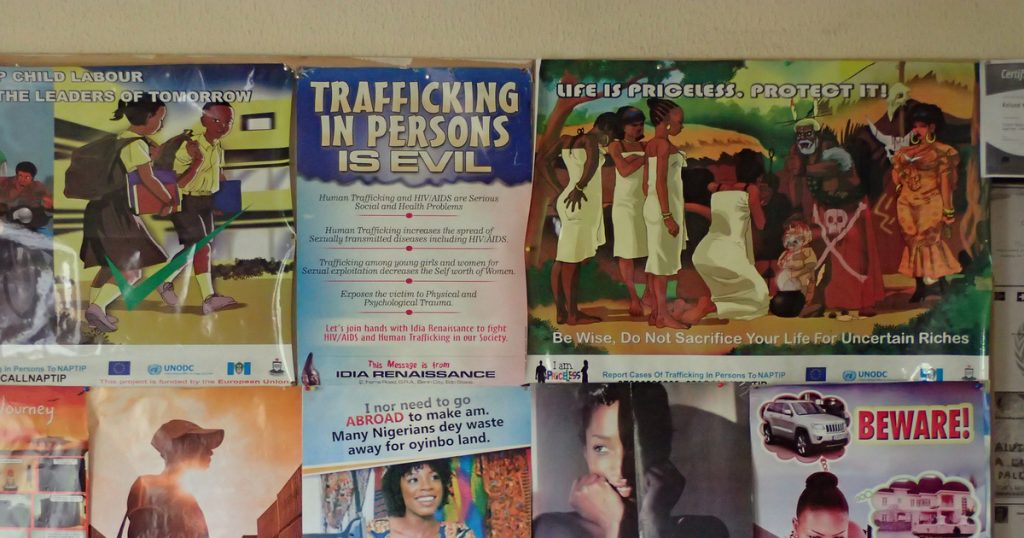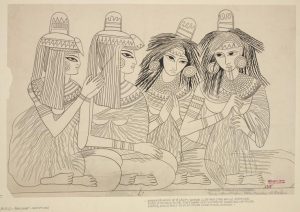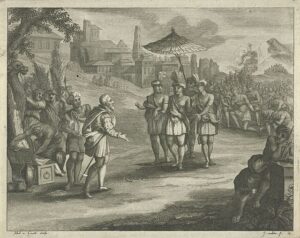Traditionally, when one imagines how someone ends up in slavery of any kind, one sees images of people being forcibly taken from their homes and sent to a foreign country, with absolutely no say in the matter. While this is usually the case in sexual slavery and for other kinds of bondage, it is no longer the case for women from Edo State in Nigeria, that provides 80% of women trafficked into Europe.1 Instead, there is a new phenomenon where women seek out passage to Europe through Madams, knowingly entering into prostitution. This was not always been the case, but extreme poverty, where some even lack running water, this practice has begun flourishing.2

Previously, recruiters lure women with tales of jobs in Europe, working for wealthy families, being hairdressers or nannies, only to find out the harsh reality of forced sex work once they arrived. Eventually, returning with embellished stories of wealth to tempt and recruit women themselves, completing the vicious cycle from victim to perpetrator. Some of the Madams even live in lavish houses, behind gates, as a testament of just what can be earned in European sex work. This show of wealth, in a desperate state, slowly began to transform just how women were recruited into the sex trafficking world.3
More recently, traffickers are being sought out by their victims in hope for a better life for themselves and their families.4 Little do they know of the harsh conditions and abuse they will endure before they can ever return home. After discussion of the “terms” of the work, the women sign legally binding contracts that say they will pay back rent, travel expenses, food, and other miscellaneous expenses, sometimes in a matter of months, sometimes in many years. These expenses total anywhere from 30,000 to 60,000 US dollars, on average. Usually, the women charge 5 to 10 US dollars per client, requiring them to work from sunup to sundown, and sometimes longer.5

Aside from relying on the signed contracts, Madams and pimps use the threat of violence against families, and religion, to keep the women from leaving.6 Using black magic referred to as JuJu, priests perform complex rituals that include eating raw chicken hearts, harm to oneself, drinking cocktails of their own fingernails, hair, and blood, as well as other methods, to bind the women with their traffickers. After completion of the rituals, they are made to feel that death, insanity, or harm will come to their families if they are to break their oath of repayment. A priest, who has benefited greatly from Madams and the pimps he has helped, stated in an interview that the purpose of these rituals are that “she never sleeps well or has peace of mind until she pays what she owes.”7

Furthermore, religion and belief in the negative effects that stem from the severance of the oaths have even led parents to become more complacent and insist that their daughters follow the requests of the people who are exploiting them.8 This, coupled with extreme poverty, exacerbate the growing phenomenon in Edo State, rendering it even more difficult to combat. Though, there are efforts to better the lives of women in Edo State. Education promotes agricultural development and other “basic needs industries,” and is central to the campaigns to inform about the horrors and negative effects of trafficking, and working toward the decriminalization, not legalization, of prostitution to help, instead of punish, those who have been ensnared in a vicious cycle of abuse which is making strides.9
New policies and rules are being implemented and promoted by grassroots organizations, and governments are taking notice. On November 15, 2000, the UN established a “Protocol to Prevent, Suppress and Punish Trafficking in Persons, Especially Women and Children, supplementing the United Nations Convention against Transnational Organized Crime,” which has 173 signatories, showing the world that these malum in se actions have become malum prohibitum or universally illegal, and punishable internaitonally.10 Even with all of these measures, and the recognition of this epidemic at an international level, there are still roughly 4.8 million people (19% of all humans trafficked) enslaved for sexual exploitation in the world, bringing in 99 billion dollars annually (66% of all profits from human trafficking).11 More must be done to end all forms of human trafficking, and it starts with a deeper understanding of the differing local and cultural patterns of recruitment throughout the world. Education and the provision of alternative work options remain the most powerful deterrents.
- Seema Kawar, From Benin City to the Shores of Italy: A New Hub of Human Trafficking, NAOC, (Accessed January 31, 2018), http://natoassociation.ca/from-benin-city-to-the-shores-of-italy-a-new-hub-of-human-trafficking/. ↵
- Abaobi Tricia Nwaubani, Cycle of exploitation turns Nigerian sex slaves in Italy into traffickers, News.trust.org, (Accessed February 12, 2018), http://news.trust.org/item/20161108000327-qfsaw/. ↵
- Abaobi Tricia Nwaubani, Cycle of exploitation turns Nigerian sex slaves in Italy into traffickers, News.trust.org, (Accessed February 12, 2018), http://news.trust.org/item/20161108000327-qfsaw/. ↵
- Abaobi Tricia Nwaubani, Cycle of exploitation turns Nigerian sex slaves in Italy into traffickers, News.trust.org, (Accessed February 12, 2018), http://news.trust.org/item/20161108000327-qfsaw/. ↵
- Esohe Aghatise, Iroko Onlus: Working to Combat the Trafficking of Nigerian Women and Girls Into Italy, Canadian Woman Studies 22, no. 3/4 (2003): 197-199, Humanities Full Text (H.W. Wilson), EBSCOhost (accessed January 31, 2018). ↵
- Esohe Aghatise, Iroko Onlus: Working to Combat the Trafficking of Nigerian Women and Girls Into Italy, Canadian Woman Studies 22, no. 3/4 (2003): 197-199, Humanities Full Text (H.W. Wilson), EBSCOhost (accessed January 31, 2018). ↵
- C. S. Baarda, Human trafficking for sexual exploitation from Nigeria into Western Europe: The role of voodoo rituals in the functioning of a criminal network, European Journal Of Criminology 13, no. 2 (2016): 257, Complementary Index, EBSCOhost (accessed January 31, 2018). ↵
- Abaobi Tricia Nwaubani, Cycle of exploitation turns Nigerian sex slaves in Italy into traffickers, News.trust.org, (Accessed February 12, 2018), http://news.trust.org/item/20161108000327-qfsaw/. ↵
- Esohe Aghatise, Iroko Onlus: Working to Combat the Trafficking of Nigerian Women and Girls Into Italy, Canadian Woman Studies 22, no. 3/4 (2003): 197-199, Humanities Full Text (H.W. Wilson), EBSCOhost (accessed January 31, 2018). ↵
- United Nations, Protocol to Prevent, Suppress and Punish Trafficking in Persons, Especially Women and Children, supplementing the United Nations Convention against Transnational Organized Crime, International Law & World Order: Westons & Carlsons Basic Documents, November 15, 2000, doi:10.1163/2211-4394_rwilwo_sim_033351. ↵
- Human Trafficking by the Numbers, Human Rights First, January 7, 2017. (Accessed February 12, 2018), https://www.humanrightsfirst.org/resource/human-trafficking-numbers. ↵



90 comments
Nathalie Herrera
This article was an eye opener for me in many ways. The fact that sex trafficking exists is awful but even worse to read that many people from Nigeria voluntarily go into this for a “better life.” Although, hopefully with the UN aiding for change and overall helping others, sex trafficking can be abolished. This of course will be a great challenge seeing we are facing it right now, but hopefully in the end things will come out in a brighter light. Great read!
Crystal Baeza
I wish there was more attention towards the problem we have in today’s world with sex trafficking. I specifically cannot believe this type of stuff happens in less fortunate areas where girls are just trying to find a better life for themselves and families and get tricked instead. It’s upsetting how disgusting people can be attacking a vulnerable state. I would have to stay this article did catch my eye and was well put together with information.
Sarah Nguyen
Great article – it was very educating to see the many different sides of sex trafficking, and how and why it is happening. One thing I wished was more of an explanation when you mentioned the “vicious cycle” where the women come back and exaggerate /flaunt their wealth to lure other women in. Why would they flaunt nonexistent wealth to pull other women into the sex trafficking world too?
Again, great article, I liked how it prompted questions!
Mariah Garcia
It is sad to know that sex trafficking is a major problem. It is terrible and many who are able to get out are never the same. But, the issues in Nigeria where the women and children knowingly get into it for a better living condition is so heartbreaking. They have to sign legally binging contracts and madams and pimps use threat of violence on the people families to make them stay. I hope that with the help of the government the percentage of women and children in sex trafficking can reduce and give hope to a better future.
Angel Torres
It deeply saddens me about the horrible conditions some people live in that in order for them to make a living they resort to being sex trafficked. There is also the other side of the story where women are lured into sex trafficking through an illusion that they will be offered jobs in other countries. Sex trafficking is a major problem on a global scale that needs to be addressed. Furthermore, the article provided a detailed account into the sex trafficking that is occurring in Nigeria. I found it interesting how Pimps and Madams would make women sign legally binding contracts and perform black magic rituals on the women.
Cynthia Rodriguez
I was intrigued from the very beginning of the article. Once I read that some Nigerian women are not forced into sex trafficking, I wanted to keep on reading and understand why they would willingly put themselves into that situation. As I kept reading, I learned that one of the main reasons is poverty. The women who do this are promised a wealthy life and they go through with it in order to better their own lives and the lives of their families. Something that struck me is that they are under a contract and have to repay a certain amount of money. It saddens me that these women go through harsh conditions and abuse, when they only went into prostitution to help get them out of the poor conditions they were in before. I thought it was an excellent article that was well-written and I liked that it shed light on an important issue.
John Smith
It’s horrible that women have to go through such horrible things just for the promise of wealth. I am glad however that human trafficking is considered universally illegal, even though it might not spark the change that Nigeria desperately needs to protect its women and children. I can only hope that in the coming years Nigeria can prove to protect its people from themselves.
Donte Joseph
Sex trafficking is a major problem in the world today. In places like Nigeria, it makes sense that women would be tricked into participating because they are promised money that they need. Through all the problems the best thing to happen is that people are finally doing something about the issue like passing a law like stated in the article. While a law will not end sex trafficking, it will help lower the victims count whether it be one person or one thousand people.
Michael Thomas
I found this article interesting because of how it details the sex trafficking in Nigeria and how it is being combatted. It is disappointing that women from countries like Nigeria are lured into sex trafficking with the illusions of jobs away from their countries. Yet, some of these women use this as a way to make money for their families. It is a good thing that sex trafficking is being combatted in Nigeria to end this false job. Overall, this article was well-written, good, and informative.
Irene Astran
I am happy to hear some kind of action is being taken to alleviate the issue in Nigeria. I hope that people can find solace in knowing that the UN has sunk their teeth into helping the situation and that this is not soliciting false hope. Aside from that, I really appreciated the creativity that went into your title. It really grabbed my attention.